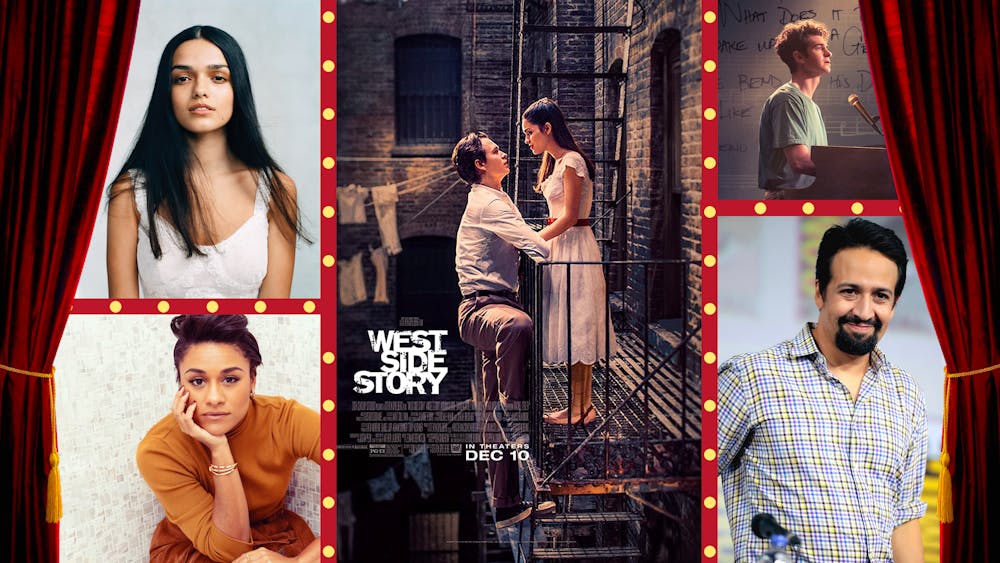Musical films, colloquially known as “movie musicals,” are notoriously difficult to get right. Oftentimes the viscera of the moment is lost when an inherently live art form is translated to the screen. Movie musicals run the gamut from good, to bad, to ugly. The ugliest of these films reach some of the lowest lows in cinematic history—think the disturbing CGI of Cats or the gaudy disco of Xanadu. Sometimes what works on a stage just can’t be recaptured in films, as was the case for The Phantom of the Opera or Les Misérables.
Unfortunately, in Steven Spielberg’s new adaptation of the forever classic West Side Story, the careful artistic balance required is off. Although the film’s approach to updating the story and reducing problematic elements is impressive, it fails to capture the magic of the original movie musical—especially for longtime West Side Story fans. Tony Kushner’s revisions of Arthur Laurents’ book forget how meticulously the lyrics and music of the score are tied into the storyline; the changes leave the thematic elements feeling disconnected from the musical motifs. Yes, the story lends new attention to the systemic biases that would've informed the real–life historical context, but there was a way to do just that while still maintaining the essential youthful energy that pulses through the score. This energy informs nearly all the character choices, and centers the story on teenagers striking out against systems outside of their control. The new screenplay neglects the story’s roots as an adaptation of Romeo and Juliet, in which the main characters yearn against a helpless feud and ignite a passionate infatuation while ignorant of the inevitable tragedy. Other issues—like the cramped feeling of some of the new choreography and the general lack of chemistry between Rachel Zegler and Ansel Elgort—do not help the situation.
That’s not to say that the film is all bad: Spielberg’s direction led to some of the most beautiful cinematography of the year, and many have been quick to highlight the amazing performances of Ariana DeBose and Mike Faist. The casting alone reflects a sensible respect for the talents of musical theatre performers that is in deep contrast to the ever–common practice of stunt casting (*cough* Ariana Grande in the upcoming Wicked film). With positive reception from many critics, a hefty handful of Oscar nominations, and an already impressive showing at the Screen Actors Guild Awards, one thing is clear: The film’s issues are outweighed by its potential significance in the resurgence of the movie musical.
West Side Story, like 2021’s In the Heights and tick, tick…BOOM! is showing the world that movie musicals can be taken seriously again. Moments like “Over The Rainbow” in The Wizard of Oz or Gene Kelly swinging from a lamppost in Singin’ in the Rain demonstrated the genre’s impact on the previous generations of film. The 1961 West Side Story exemplified—more than any other picture—the power of film to not only capture, but even augment, the power of musical theatre. Like its predecessor, this West Side Story is flawed, but will carry a powerful legacy, especially in the large audience it's reached while streaming on Disney+.
Thanks to streaming, West Side Story has become available to groups across the country who may not have access to musical theatre. The viewing of musicals at home has been occurring for years, either on specialized streaming platforms like BroadwayHD or illegally through bootleg recordings. However, one perk of the COVID–19 pandemic for theatre lovers has been the drive for more accessible musicals and plays. There haven’t just been movie musicals—while Broadway was shut down, filmed versions of stage performances (also known as pro–shoots) brought popular shows like Hamilton and Come From Away to a wider audience. Bringing musicals to streaming platforms doesn’t only boost the theatre industry and the many performers and technicians that put it together. It also helps fans—those who may not be able to venture to New York City on a whim and sell their right leg for tickets—to get a taste of the magic.
So, while West Side Story didn’t measure up to every expectation, we should certainly be glad it was made. It’s part of a new generation of movie musicals that show the world why the theatre deserves to be beloved and shared. Let’s be glad that moviegoers are giving the musical a second chance to bring some razzle dazzle to the rest of the country.

